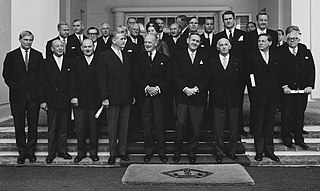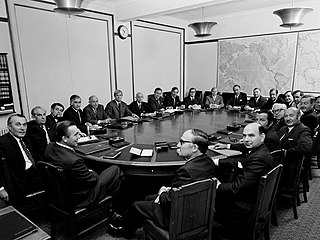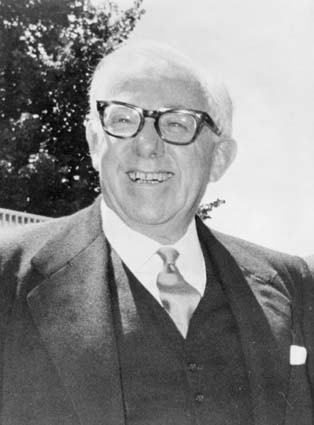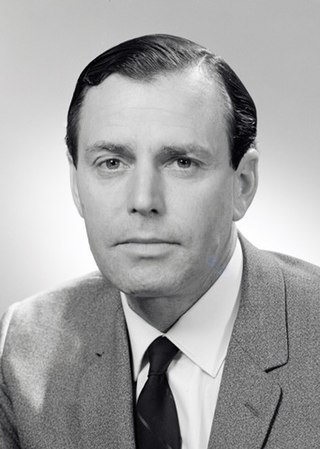
Sir John Grey Gorton was an Australian politician, farmer and airman who served as the 19th prime minister of Australia from 1968 to 1971. He held office as the leader of the Liberal Party of Australia, having previously served as a senator for Victoria. He was the first and only member of the upper house of the Parliament to assume the office of prime minister.

Sir William McMahon, also known as Billy McMahon, was an Australian politician who served as the 20th prime minister of Australia from 1971 to 1972. He held office as the leader of the Liberal Party of Australia, and previously held various ministerial positions from 1951 to 1971, the longest continuous service in Australian history.

John Douglas Anthony was an Australian politician. He served as leader of the National Party of Australia from 1971 to 1984 and was the second and longest-serving deputy prime minister, holding the position under John Gorton (1971), William McMahon (1971–1972) and Malcolm Fraser (1975–1983).

Ian McCahon Sinclair is an Australian former politician who served as a Member of Parliament for 35 years, and was leader of the National Party from 1984 to 1989. He served as either a minister or opposition frontbencher for all but a few months from 1965 to 1989, and later Speaker of the House of Representatives from March to August 1998.

The First Gorton ministry was the 44th ministry of the Government of Australia. It was led by the country's 19th Prime Minister, John Gorton. The First Gorton ministry succeeded the McEwen ministry, which dissolved on 10 January 1968 following the election of Gorton as Liberal leader after the disappearance of former Prime Minister Harold Holt. The ministry was replaced by the Second Gorton ministry on 12 November 1969 following the 1969 federal election.

The Second Gorton ministry was the 45th ministry of the Government of Australia. It was led by the country's 19th Prime Minister, John Gorton. The Second Gorton ministry succeeded the First Gorton ministry, which dissolved on 12 November 1969 following the federal election that took place in October. The ministry was replaced by the McMahon ministry on 10 March 1971 following the resignation of Gorton.

The McMahon ministry was the 46th ministry of the Australian Government. It was led by the country's 20th Prime Minister, William McMahon. The McMahon ministry succeeded the Second Gorton ministry, which dissolved on 10 March 1971 following the resignation of John Gorton as Prime Minister. The ministry was replaced by the First Whitlam ministry on 5 December 1972 following the federal election that took place on 2 December which saw Labor defeat the Coalition.

The third Fraser ministry was the 52nd ministry of the Government of Australia. It was led by the country's 22nd Prime Minister, Malcolm Fraser. The third Fraser ministry succeeded the second Fraser ministry, which dissolved on 20 December 1977 following the federal election that took place on 10 December. The ministry was replaced by the fourth Fraser ministry on 3 November 1980 following the 1980 federal election.

William Charles Wentworth, usually known as Bill Wentworth and sometimes referred to as William Charles Wentworth IV, was an Australian politician. He was a member of the Liberal Party for most of his career and held ministerial office in the governments of John Gorton and William McMahon, serving as Minister for Social Services (1968–1972) and Minister in charge of Aboriginal Affairs (1968–1971). Wentworth served in the House of Representatives from 1949 to 1977, representing the New South Wales seat of Mackellar. He frequently crossed the floor and served his final months in parliament as an independent.

Orbost is a town in the Shire of East Gippsland, Victoria, Australia, 375 kilometres (233 mi) east of Melbourne and 235 kilometres (146 mi) south of Canberra where the Princes Highway crosses the Snowy River. It is about 16 kilometres (10 mi) from the surf and fishing seaside town of Marlo on the coast of Bass Strait and 217 km (135 mi) drive to Hotham Alpine Resort. Orbost is the service centre for the primary industries of beef, dairy cattle and sawmilling. More recently, tourism has become an important and thriving industry, being the major town close to several national parks that are between the east access to either the surf or the snow, including the famous Snowy River National Park, Alpine National Park, Errinundra National Park, Croajingolong National Park and Cape Conran Coastal Park.

Sir Phillip Reginald Lynch KCMG was an Australian politician who served in the House of Representatives from 1966 to 1982. He was deputy leader of the Liberal Party from 1972 to 1982, and served as a government minister under three prime ministers.

Thomas Eyre Forrest Hughes was an Australian barrister and politician. A member of the Liberal Party, he served as Attorney-General in the Gorton government from 1969 to 1971, and was a member of the House of Representatives from 1963 to 1972, representing the New South Wales seats of Parkes and Berowra. He was a president of the New South Wales Bar Association and was one of Sydney's most prominent barristers for a number of decades. Hughes was the last surviving Liberal minister of the Gorton and McMahon governments.

James Joseph Webster was an Australian politician. He was a Senator for Victoria from 1964 to 1980, representing the National Country Party (NCP). He served as Minister for Science (1975–1978) and Science and the Environment (1978–1979) in the Fraser government. He left politics to become High Commissioner to New Zealand, serving from 1980 to 1983.

Ralph James Dunnet Hunt AO was an Australian politician. He was a member of the National Party and served as the party's deputy leader from 1984 to 1987, under Ian Sinclair. He was a senior minister in Coalition governments, serving as Minister for the Interior (1971–1972), Health (1975–1979), and Transport (1979–1982), and Transport and Construction (1982–1983). He represented the New South Wales seat of Gwydir in the House of Representatives from 1969 to 1989.

Sir Thomas Charles Drake-Brockman, was an Australian politician who served as a Senator for Western Australia from 1959 to 1978 and also briefly in 1958. He was a member of the National Country Party. He served as Minister for Air from 1969 to 1972.

The Gorton government was the federal executive government of Australia led by Prime Minister John Gorton. It was made up of members of a Liberal-Country Party coalition in the Australian Parliament from January 1968 to March 1971.

The McMahon government was the period of federal executive government of Australia led by Prime Minister William McMahon of the Liberal Party. It was made up of members of a coalition between the Liberal Party and the Country Party, led by Doug Anthony as Deputy Prime Minister. The McMahon government lasted from March 1971 to December 1972, being defeated at the 1972 federal election. Writing for the Australian Dictionary of Biography, Julian Leeser describes McMahon's prime ministership as "a blend of cautious innovation and fundamental orthodoxy".

A spill of the leadership of the Liberal Party of Australia took place on 21 March 1975. It came about as a result of Malcolm Fraser's continued dissatisfaction with the party's direction under Billy Snedden. Fraser's challenge was successful – he defeated Snedden by 37 votes to 27, thus becoming Leader of the Opposition.

The Liberal Party of Australia held a leadership spill on 10 March 1971. Prime Minister John Gorton called for a vote of confidence in his leadership, which was tied, prompting Gorton to resign. William McMahon subsequently defeated Billy Snedden for the leadership, and was sworn in as prime minister on the same day. Gorton was elected as his deputy, defeating Malcolm Fraser and David Fairbairn.
The Australian meat substitution scandal of 1981 involved the widespread substitution of horse meat and kangaroo meat for beef in Australia. While the substitution primarily affected meat exported overseas, particularly to the United States, further investigations revealed that these as well as donkey meat and pet food had been packaged for human consumption and non-halal meat sold as halal meat domestically in Australia as well.


















